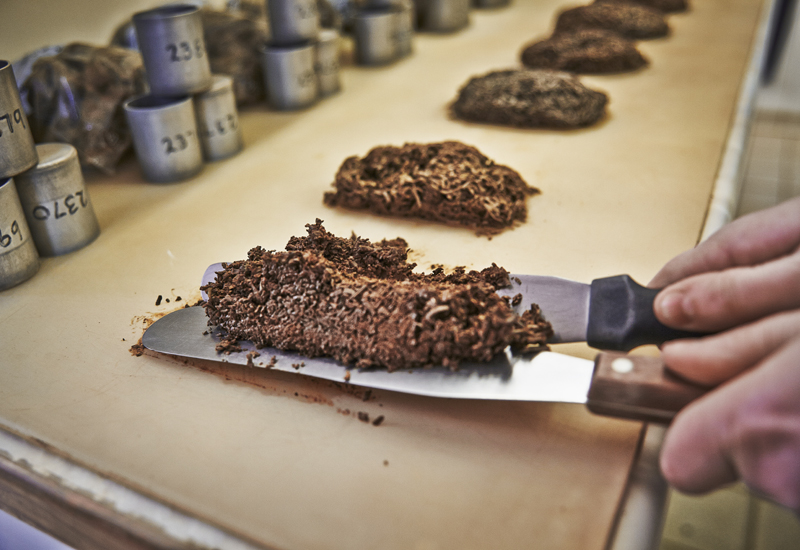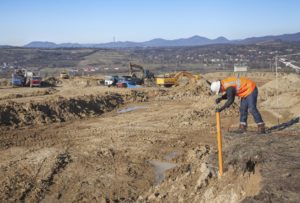
Materials testing and site investigation is a vital component of a building project, but when should you engage test specialists? Gary Corrigan, Commercial Director from CET argues that it should be from the outset and throughout.
Materials testing and site investigation is an integral part of any infrastructure project, particularly brownfield. Whilst some construction companies have retained some internal geotechnical expertise, an increasing number are turning to specialist contractors to provide a breadth and level of service they no longer maintain in-house. If materials testing is no longer a core service, some businesses may underestimate its value and assume an ad-hoc approach; only considering the need for testing as a contract proceeds. However, this could end up costing them both time and money.
 Within the manufacturing industry, the supply chain often plays an integral role in the early stages of product design and development. The principle of bringing materials experts to the table from the outset is well established. It helps manufacturers gain a more realistic view of what is achievable; both in terms of production planning and component design. This early engagement can help avoid the need for subsequent re-design or expensive remedial action, leading to production delays.
Within the manufacturing industry, the supply chain often plays an integral role in the early stages of product design and development. The principle of bringing materials experts to the table from the outset is well established. It helps manufacturers gain a more realistic view of what is achievable; both in terms of production planning and component design. This early engagement can help avoid the need for subsequent re-design or expensive remedial action, leading to production delays.
The same is true for construction projects. Whilst materials testing is typically a very small part of the overall budget, the consequences of getting it wrong can be time consuming and expensive and so best practice begins with establishing the right test specs from the outset.
Experience is key
As fewer contractors have testing specialists in-house, developing the test specs often falls to someone without experience of complex testing schedules or requirements. Cutting and pasting a list of requirements from previous projects is a risky way to go about things as they may not accurately reflect the site investigation data or materials likely to be encountered on-site. The wrong schedule or list of requirements could lead to mis-classification and the inefficient use of site-won materials.
Although all construction firms are aware of the need for testing, they may not always be best placed to interpret the findings. Detailed assessment of early, or even pre-acquisition, investigations can help provide a competitive advantage during the tender process and can help mitigate risk. Involving a geotechnical or materials expert early in the process can go a long way to ensuring the best use of materials.
For example, identifying modification principles that can be applied on-site and re-working unsuitable to suitable fill materials can reduce the volume of materials imported and exported; helping to reduce costs and build times.
Early engagement
Materials testing on infrastructure projects is a mandatory requirement. It is important to get the right testing schedule in place, from a compliance perspective if nothing else. Early engagement with a testing house has the potential to both reduce the cost and timelines associated with many projects. A full evaluation of the programme of works and a detailed test plan will help identify the resource required throughout the project and ensure that the test schedule is both appropriate and meets the requirements of the original specification.
Engaging with testing experts up front can also change the way contractors go  about project planning. Analysing each project on its individual merits will allow requirements to be reviewed against frequencies for each activity, such as earthmoving, to ensure test schedules match daily site output. Timelines may also need to be reviewed to ensure enough time has been allocated for the sampling and testing of materials.
about project planning. Analysing each project on its individual merits will allow requirements to be reviewed against frequencies for each activity, such as earthmoving, to ensure test schedules match daily site output. Timelines may also need to be reviewed to ensure enough time has been allocated for the sampling and testing of materials.
One of the biggest challenges for a testing house brought in part-way through a project, is addressing the difference in timelines between what was estimated during planning and the actual time needed to collect samples and carry out tests. If the assumed timescales are unrealistic, testing can be seen as disruptive and causing delays; whether the tests are carried out on-site or back in the lab.
Concrete testing
One specific area where the right expertise can have a significant impact on site production efficiency is concrete testing. Concrete poured on site will need to be tested in accordance with BS EN 12390; to establish its quality from an early stage in construction. Cube testing undertaken in the correct conditions is a simple and reliable method; but if it’s not done correctly, test specimens can deliver false results that not only present inaccurate data but can also lead to costly and unnecessary investigations.
How the concrete test regime is organised will depend on the size and complexity of the project. For major schemes, best practice may be to establish an on-site UKAS accredited laboratory. This would ensure that dedicated, contract-specific technicians are on-hand to manufacture and sample the cubes; and that on-site curing facilities are available.
 For smaller projects, where construction company personnel take the samples and manufacture the cubes, basic technical training is still required to ensure that moulds are properly calibrated and cubes manufactured using equipment with the correct British Standard certification. If a project is likely to involve specialist investigations, early engagement with a specialist geotechnical team is essential. Producing test schedules, risk and method statements well in advance of the works will ensure regulatory compliance, mitigate risk, reduce project delays and help ensure competitive pricing.
For smaller projects, where construction company personnel take the samples and manufacture the cubes, basic technical training is still required to ensure that moulds are properly calibrated and cubes manufactured using equipment with the correct British Standard certification. If a project is likely to involve specialist investigations, early engagement with a specialist geotechnical team is essential. Producing test schedules, risk and method statements well in advance of the works will ensure regulatory compliance, mitigate risk, reduce project delays and help ensure competitive pricing.
Highway, airport and trackside investigations may involve testing in restricted areas or within constrained timeframes. Undertaking GPR or pavement core and subgrade sampling within these complex environments may also require traffic management or securing permits to carry out works. Establishing a comprehensive schedule of works, one that can be shared with all stakeholders from the outset, can help ensure efficient delivery and avoid delays.
Early engagement with an experienced testing house or geotechnical consultancy can deliver a wide range of benefits. Tender support can ensure a suitable schedule of tests; accurate testing can enable a more efficient use of site-won materials; realistic timelines for sampling and testing can avoid unnecessary delays; and the provision of on-site testing facilities can speed up project delivery times.








